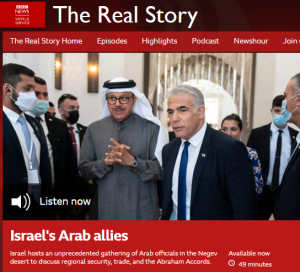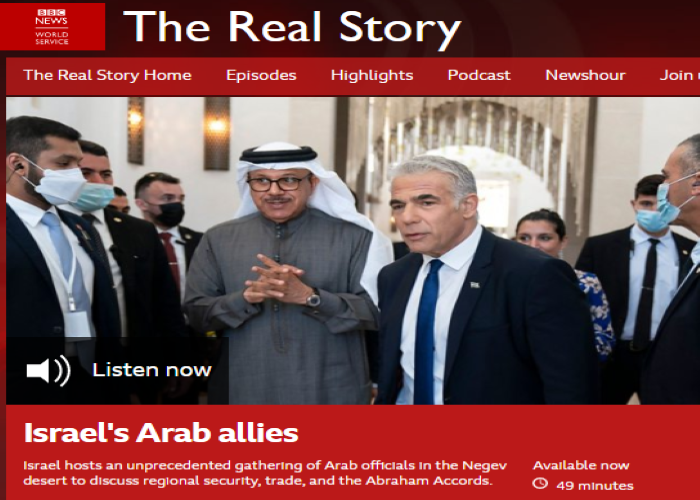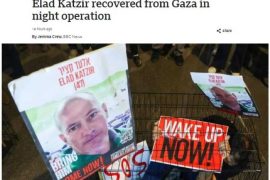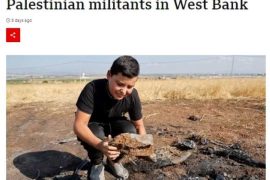The April 1st edition of the BBC World Service radio programme ‘The Real Story’ – presented by Julian Marshall – was titled “Israel’s Arab Allies”.
“History was made this week when, for the first time, the foreign ministers of the UAE, Morocco, Egypt and Bahrain travelled to Israel on an official visit. For decades Arab leaders have criticised Israel for its occupation of the West Bank and Gaza, which appeared to rule out closer ties. But not anymore. After the meeting Emirati Foreign Minister Sheikh Abdullah bin Zayed Al Nahyan told his Israeli counterpart, Yair Lapid, “you are not only a partner, you are a friend,” adding that the countries have lost decades that could have been utilised, “knowing each other better, of working together, and of changing the narrative that many generations of Israelis and Arabs have been living.” The United States has spent recent years working to improve relations between its Israeli and Arab partners, an effort that burst into the public consciousness with the signing of the Abraham Accords under Donald Trump. The new allies share a distrust of Iran and a desire for greater economic ties across the region. But the Palestinian leadership has criticised the rapprochement, describing it as “a free reward for Israel”. So what’s been the benefit of the Abraham Accords? Will a new Iran nuclear deal push the parties even closer? What kind of support will these countries require from the United States at a time when US interest in the region is declining? And how many of the government-to-government ties are being translated into people-to-people contacts? Julian Marshall is joined by a panel of experts.”
In addition to those contributors – Noga Tarnopolski, Linda Robinson and Steven Cook – listeners heard interviews with three people hardly renowned for their commitment to telling ‘the real story’ behind Middle East events.
The first of those interviews came at 17:38:
Marshall: “OK, before we discuss what this new alliance between Israel and the Arab states might be able to do to counter Iran, let’s get a perspective from Tehran itself. Dr Seyed Mohammad Marandi is chair of American studies at the University of Tehran. What’s been the reaction, I asked him, in Iran to the coming together of Israel and these Arab states?”
As we all too frequently have cause to note on these pages, BBC editorial guidelines concerning ‘contributors’ affiliations’ state:
“We should not automatically assume that contributors from other organisations (such as academics, journalists, researchers and representatives of charities and think-tanks) are unbiased. Appropriate information about their affiliations, funding and particular viewpoints should be made available to the audience, when relevant to the context.”
Nevertheless, Marshall made no effort to inform listeners that beyond his quasi-neutral academic title, Mohammad Marandi is a long-time Iranian regime loyalist and propagandist who has been described by the BBC in the past as having “close ties to the government in Tehran”. Despite the clear relevance to this particular interview, Marshall failed to clarify to BBC audiences around the world that the claims they were about to hear came from a man correctly described only two months ago by the BBC as “media advisor to Iran’s nuclear negotiation team”.
Marandi: “Iran wasn’t surprised. These countries behind the scenes have always been very close. But I think that the fact that this came out in the open is actually hurting these Arab countries more than when the relationships were secret because the local populations in each of these countries are extremely hostile towards the Israeli regime. So by coming out in the open, these countries make themselves more vulnerable to anger and hostility across the Arab world.”
Marshall: “But now that the alliance – if you can call it that – has come out into the open, does Iran see it as being more of a threat?”
Marandi: “Not really, unless there is a military or serious intelligence presence anywhere near Iran’s borders. If any of these countries allow the Israeli regime to use their territory to target Iran, the Iran will make them pay a price. And when just recently we saw that the Kurdish area of Iraq in Erbil was allowing the Israeli regime to set up a major base to target Iranian centres, then the Iranians struck back with a major missile strike. So Iran was sending a message not only to the Israeli regime or to Mr Barzani but also to any of these countries that the relationship, if it’s simply bilateral or it’s linked to politics or business, that is their own affair. But if it’s linked to any sort of threat to Iran’s national security, then that will be seen as an act of hostility.”
As documented here last month, the BBC News website uncritically amplified unevidenced Iranian regime claims regarding its missile strike on the site in Erbil – which Marandi has also promoted at other media outlets such as RT. Marshall made no effort to challenge Marandi’s unsupported claim concerning a “major base” despite a recent report from Reuters which tells a different story.
Marshall: “If the Iran nuclear deal – the JCPOA – is revived as many seem to think that it will be very soon, do you expect hostility from this grouping to increase or lessen?”
Marandi’s reply to that question promotes similar themes to those he made two weeks earlier in yet another interview with RT.
Marandi: “It’s hard to say. I think that as time goes by, the United States and its European allies are going to have more difficulty in maintaining hegemony and dominance over parts of our region. And that is because of the general rise of Asia, general relative decline in Europe and North America, which I think has been intensified by the war in Ukraine. So these countries, they have to accept a new reality and that is to have decent relations with Iran. The Israeli regime is not going to be able to help them. The Israeli regime itself is a small regime. The only reason why they want good relations with this regime is because they feel that through Israel they can get more from Washington. They can get to the heart of Washington and have greater influence. But the United States, though a superpower, is not the United States of twenty, thirty years ago.”
Marshall: “That was Dr Seyed Mohammed Marandi from the University of Tehran…”
Apparently the producers of this programme – which will remain available online for “over a year” – were of the opinion that listener understanding of the historic meeting in the Negev would be enhanced by hearing talking points from an inadequately presented Iranian regime propagandist who, in the two weeks prior to this interview alone had called BBC Persian journalists “mercenaries”, the British prime minister a “murderer” and who regularly appears on a Russian channel which had its UK licence revoked.
However Marandi was not the only far from objective contributor to this ostensible attempt to provide BBC audiences around the world with ‘the real story’ behind the Negev summit, as we shall see in part two of this post.
Related Articles:
BBC NEWS GIVES UNCRITICAL AMPLIFICATION TO IRANIAN REGIME CLAIMS





